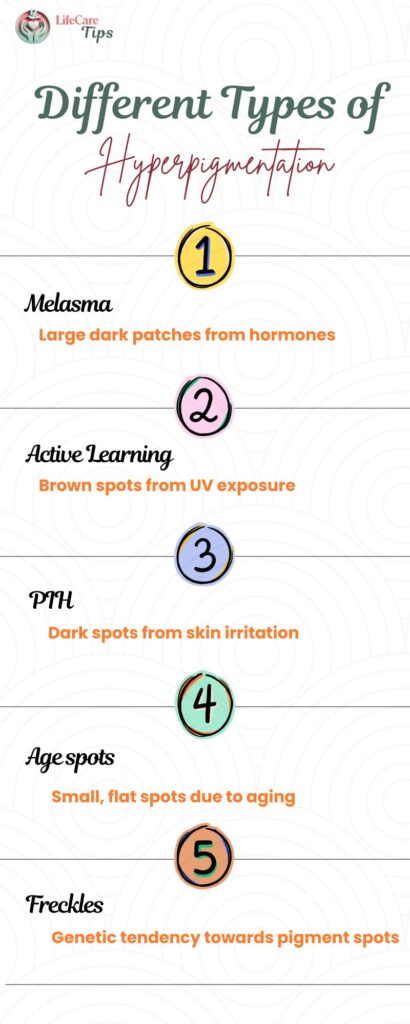Hyperpigmentation on face causes dark spots from excess melanin and is treated with acids, peels, or lasers.
Dealing with hyperpigmentation on the face can feel like a never-ending battle. Those stubborn dark spots can seriously mess with your confidence, right? You’re not alone—I know how tough it can be to see your skin not looking its best. But here’s the thing: understanding what’s causing it is the first step to taking back control. Let’s talk about what hyperpigmentation really is and how you can finally get your glow back.
What is hyperpigmentation on the face?
Hypopigmentation on the face is a condition where the skin appears lighter or paler in certain areas, causing patches that are less pigmented than the surrounding skin. This occurs due to a reduction in melanin, the pigment responsible for skin color. You’ll typically notice it in the form of:
- Uneven skin tone
- Dark spots
- Random patches across your face
Tip: Hyperpigmentation itself isn’t harmful, but it can be frustrating. Understanding its causes is key to finding the proper treatment.
What are the common causes of hyperpigmentation?
You might be wondering, Why is my skin getting darker? There are several reasons but the main reason could be pigmentation, and they can vary from person to person. Here’s what could be going on:
a. Sun Exposure: When you spend too much time under the sun it can stimulate your skin to produce more melanin, which leads to those pesky sunspots or age spots.
b. Hormonal Changes: Hormonal shifts, like during pregnancy or when taking birth control, can cause a condition called melasma, leading to dark patches on your skin.
c. Post-Inflammatory Hyperpigmentation (PIH): If you’ve had acne or any skin irritation, those dark marks that linger afterward are a form of PIH. It’s your skin’s way of healing.
d. Certain Medications: Some medications, including antibiotics or chemotherapy, can cause changes in pigmentation, leading to hyperpigmentation.
e. Underlying Health Conditions: When conditions like Addison’s disease affect your body, they can cause excess melanin production, creating darker spots on the skin.
Discover More: What-are-the-different-skin-tones-a-complete-guide
What are the different types of hyperpigmentation?
Hyperpigmentation isn’t one-size-fits-all. It comes in different forms, each with its own triggers:
| Type | Cause | Appearance |
| Melasma | Hormonal changes, pregnancy, birth control | Large, dark patches, often on the forehead, cheeks, and upper lip |
| Sunspots | Prolonged sun exposure | Small, flat brown spots, usually on areas exposed to the sun |
| Post-Inflammatory Hyperpigmentation (PIH) | Skin injuries, acne, inflammation | Dark spots left behind after skin damage |

How to get rid of dark spots on face?
Treating hyperpigmentation requires patience, but the proper methods can make a visible difference. Here’s what helps:
1. Topical Treatments
- Vitamin C – Helps brighten the skin and fades dark spots over time.
- Niacinamide – Helps reduce inflammation and controls melanin production.
- Hydroquinone – A powerful skin-lightening agent (should be used under dermatological guidance).
- Retinoids – Boosts cell turnover to gradually fade dark patches.
2. Professional Treatments
For stubborn hyperpigmentation, dermatologists may recommend:
- Chemical Peels – Uses acids like glycolic or lactic acid to exfoliate and lighten dark spots.
- Laser Therapy – Targets deeper pigmentation with focused light treatments.
- Microdermabrasion/Dermabrasion – Gently exfoliates the outer layer of skin, revealing a smoother, more even complexion.
3. Home Remedies for Mild Hyperpigmentation
If you prefer natural remedies to remove the dark spots on the body, here are some effective at-home solutions:
- 🍋 Lemon Juice (Diluted)
- 🥒 Aloe Vera
- 🥛 Milk & Yogurt
- 🍯 Honey & Turmeric
💡 Caution: Natural remedies take time and should always be followed by sunscreen to avoid worsening dark spots on skin.
Continue Reading, what-are-the-best-home-remedies-for-oily-skin
Can hyperpigmentation be prevented?
No, you can’t completely avoid some forms of hyperpigmentation, but you can reduce the risk by:
- Wear Sunscreen Daily (SPF 30+ is a must!)
- Avoid Picking at Your Skin to prevent PIH.
- Use Gentle Skincare – Harsh products can cause irritation and worsen pigmentation.
- Stay Hydrated & Eat Antioxidant-Rich Foods to support skin health.
When to see a dermatologist?
If home treatments aren’t working or your hyperpigmentation is severe, it’s time to consult a dermatologist. They may suggest:
1. Prescription-Strength Creams: Including stronger hydroquinone or retinoids.
2. Chemical Peels: A treatment to shed the outer layer of pigmented skin.
3. Laser Therapy: Targets deeper pigmentation and promotes even skin tone.
Final Thoughts: Can hyperpigmentation go away completely?
Yes, hyperpigmentation on the face can fade over time with the right treatment and care. However, patience is key—some dark spots may take weeks or even months to disappear. The main thing to remember? Stay consistent. Keep up with your skincare routine, always protect your skin from the sun, and don’t hesitate to consult a dermatologist if you need guidance.
If you found this guide helpful, head over to LifeCare Tips for more skin care advice that actually works!
FAQ’s
1. What is the best hyperpigmentation treatment for dark skin?
Some treatments that work for lighter skin may not be suitable for darker skin. Safe options include:
- Gentle AHAs (like mandelic acid) for exfoliation.
- Kojic acid and azelaic acid are used to lighten dark spots.
- Microneedling and chemical peels (under professional guidance).
2. How can I fix hyperpigmentation on my face?
Hyperpigmentation can be fixed with topical treatments, professional procedures, or natural remedies, plus consistent sunscreen use to prevent new spots.
3. Which vitamins reduce pigmentation on face?
To reduce pigmentation on the face, use vitamins like Vitamin C, Vitamin E, and Vitamin A (Retinol). These vitamins help fade dark spots, brighten skin, and promote even skin tone.
4. Which serum is best for hyperpigmentation?
The best serums for hyperpigmentation contain Vitamin C, niacinamide, kojic acid, alpha arbutin, retinoids, or glycolic acid to brighten and even skin tone.
5. How long does it take to fade hyperpigmentation?
It depends on the cause and treatment. Mild spots can fade in weeks, while deeper pigmentation may take months with consistent care.
6. Does sunscreen help with hyperpigmentation?
Yes! Sunscreen prevents dark spots from worsening and helps treatments work more effectively.

Hi, I’m Tisha Verma—a content writer with a passion for skincare and wellness. Through LifeCareTips, I share simple, practical, and reliable skincare tips, DIY remedies, and insights that truly work. My focus is on delivering honest, research-backed advice to help you care for your skin naturally. Whether it’s tried-and-tested home remedies or thoughtful reviews, I’m here to share what genuinely makes a difference—so you can make informed choices with confidence.

